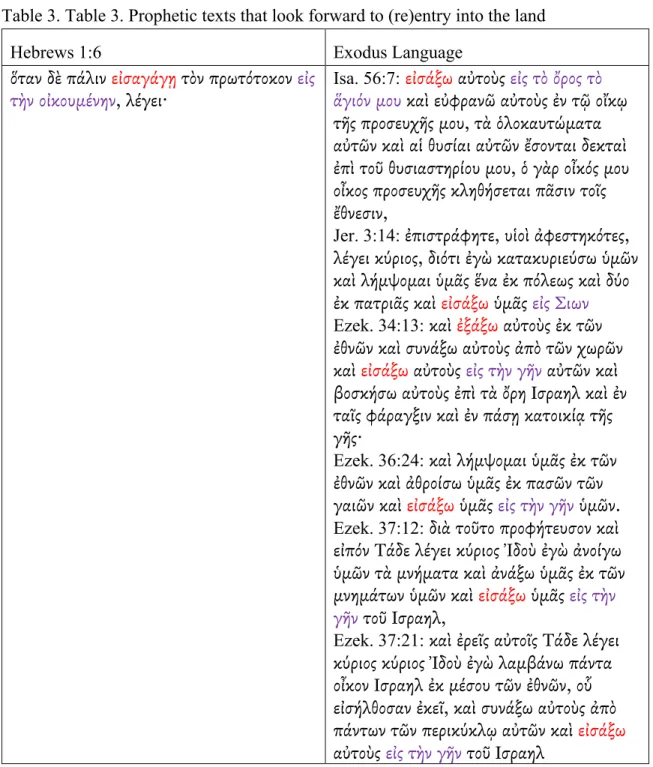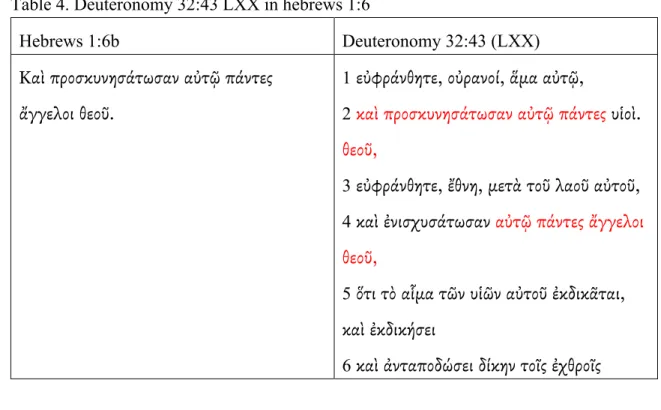ICC The International Critical Commentary on the Holy Scriptures of the Old and New Testaments. NICNT The New International Commentary on the New Testament NICOT The New International Commentary on the Old Testament. NIDNTTE New International Dictionary of New Testament Theology and Exegesis NIGTC The New International Greek Testament Commentary.
PCNT Paideia Commentaries on the New Testament PNTC The Pillar New Testament Commentary RevExp Review and Expositor. TDNT Theological Dictionary of the New Testament TDOT Theological Dictionary of the Old Testament TNTC Tyndale New Testament Commentaries TynBul Tyndale Bulletin. Jim Hamilton, whose example of a thoughtful reading of the Bible inspires me greatly; and Dr.
Our church family at Immanuel Baptist Church in Louisville is one of the most important blessings God has given us during our time at Southern Baptist.
INTRODUCTION
Hebrews' scholarship in the use of the OT in the epistle and in particular in regard to the new exodus motif.12. The contention of this thesis is that the author of the Epistle to the Hebrews used the categories "entry", "precursor or. As noted earlier, most agree that there is a substantial presence of the New Exodus motif in the Epistle to the Hebrews.
The works reviewed above represent the most important publications on the subject of the New Exodus in Hebrews. The following section provides a brief description of the method used in this project. 97Shin, The New Exodus Motiv in the Letter to the Hebrews, 86. The point of view of the author of the Letter to the Hebrews is that Israel's entry into Canaan was not the entry into God's οἰκουµένη.
The second significant change is that in Hebrews' use of the phrase εἰσαγάγῃ εἰς τὴν γῆν the writer replaces γῆν with οἰκουµένην. Up to this point I have argued that the expression εἰσαγάγῃ εἰς τὴν οἰκουµένην in Hebrews 1:6 refers to the exaltation of the Son in his heavenly world. I now turn my attention to the meaning of the exodus category of entry in Hebrews.

I hope that this chapter will add useful depth to our understanding of the concept of ἀρχηγός as it relates to the exodus motif in Hebrews. The original readers of Hebrews would not have been confused by the term ἀρχηγός. As noted above, the following subsections analyze the use of ἀρχηγός in the three main parts of the Hebrew OT.
Third, the basis for the use of the word ἀρχηγός in the LXX is the idea of leadership. The first is the expression ἀρχηγός, and the second is the syntactic function of the participle ἀγαγοντα. 23Ernst Käsemann, The Wandering People of God: A Study of the Letter to the Hebrews, trans.
26 David Peterson, Hebrews and Perfection: An Examination of the Concept of Perfection in the Epistle to the Hebrews (Cambridge, UK: Cambridge University Press, 1982), 56. This research has led me to conclude that the primary meaning of the term ἀρχηγός in this verse is is that Jesus is the leader of God's new people. 65Simon Kistemaker, Interpretation of the Epistle to the Hebrews, NTC (Grand Rapids: Baker Book House.
Cockerill's definition is valuable in thinking about the new exodus significance of the word ἀρχηγός, as used in Hebrews. Given the exodus importance of the ἄγω verb family in Hebrews, this verbal overlap between Hebrews 1:6 and 2:10 is worth further investigation. So the context for understanding the historical event of the exodus is the promise to the patriarch Abraham.
This is because Moses played more than one role in the grand scheme of the exodus. Richardson, Pioneer and Perfecter of Faith: Jesus' Faith as the Climax of Israel's History in the Epistle to the Hebrews (Tübingen: Mohr Siebeck for more on the context of the term "apostle" in Hebrews 3:1. In this unit the author's interest in framing his argument in terms of the exodus emerges again.
3 Ernst Käsemann, The Wandering People of God: An Investigation of the Letter to the Hebreers, trans.
It is hard to miss Hebrews' admonishing strategy of placing the circumstances of the readers in the light of the experience of those who left Egypt under Moses (Heb. In 3:7-19 the writer makes his argument through psalm 95.7 author's thoughts, the situation of the Israelites in the desert shares significant overlap with the circumstances of his addressees and Psalm 95 is the lens through which those overlaps are seen most clearly. I will pay particular attention to the way in which the author draws on these OT texts to portray the experience of the audience as an eschatological wilderness journey en route to the eschatological rest The theme of the exodus is made clear in the psalm from the second half of verse 7 to the end of the chapter where there are explicit and specific references to the exodus (Ps 95:7b-11).
In fact, the explicit references to the Exodus journey in the second part of Psalm 95 provide positive evidence that the author of Hebrews had an interest in framing his readers' circumstances in terms of the Exodus journey. 11Hossfeld and Zenger affirm that “the creator of the world is also the creator of Israel. With regard to the phraseology of the quote, the author of Hebrews closely follows the LXX text of Psalm 95 (LXX 94) with only minor variations.13 Of these variations, two are important for our purposes here.
The first is that the Septuagint translation of the place names Meribah and Massah corresponds to the author with the interpretations τῷ παραπικρασµῷ and τοῦ πειρασµοῦ.14 The result of this interpretation "is that the text of the place names is less closely related to what happened in a certain place in the desert and it is easier to apply to the action. Is the forty year period mentioned in this verse a description of the time of God's wrath (as in the psalm, see v. 10) or a description of the time of God's wonderful works. However, the insertion of διό clearly indicates two different periods, the first marked by God's wonderful activity and the second by God's wrath on account of men.
This rebellion and irredeemable condition of the Israelites (note God's oath that . "They shall not enter into my rest") is exactly what the author of Hebrews warns his readers about when he says "let us be diligent." This understanding of Israel's wilderness period serves to emphasize the severity of the judgments that will befall anyone who rejects what God has accomplished in the Son and turns away from the living God. The use of psalm 95 by the Hebrews clearly presents the circumstances of the readers as an eschatological analogue of the situation of those who left Egypt under Moses.
The line of argument of Hebrews emphasizes the fact that the author was familiar with "a primitive and widespread Christian interpretation of the redemptive work of Christ in terms of a new Exodus."22 The author "uses [this interpretation], therefore to warn [ his readers] against giving up their faith and hope."23 Furthermore, the author's use of psalm 95 integrates earlier texts on Israel's rebellion in the wilderness in a beautifully artistic way. In fact, an examination of the influence of The book Numbers in the Argument of Hebrews 3 promises to help emphasize the cohesion in the author's argument since Hebrews 3:2.
The writer of the letter intends that his readers should consider their whole life in the world as a wilderness journey to the final rest. What this means is that the audience of the letter sees him in such a. There are at least a few other pilgrimage concepts that the writer of Hebrews expresses in the context of Hebrews 3-4 and the rest of the epistle.
37For a summary of the various views, see Coyne, "The Wandering People of God and the Metaphoical World of Wilderness in the Epistle to the Hebrews," 210-213. But the way we enter into the new rest is by following Ἰησοῦς the Son of God and striving through the wilderness of the present world. Nevertheless, the reference to the tabernacle still carries weight when it comes to estimating the date of the composition of Hebrews.
However, it is not clear how a reference to the tabernacle rather than the temple fosters a sense of clear Christian identity. 52 The OT and NT scriptures connect the tabernacle with the wilderness (cf. I argued in chapter 3 of the present project that the term ἀρχηγός is roughly synonymous with προδρομος (Hebrews 6:20).
Schreiner has also questioned the plausibility of the claim that the expression τοὺς ἅπαξ φωτισθέντας in Hebrews 6:4 refers to the light that illuminated the exodus generation. Moses felt overwhelmed by both the formidable task (Exodus 3:11) and the extreme danger of attempting to free a people from a nation from which he himself was fleeing (Exodus 2:15). The same is true of the Zion to which readers have come in much greater measure.
In the second part of the chapter I have focused on the final destination of God's new covenant people. I have also been aware of the author's use of exodus language from Isaiah's vision of the exiles returning to Zion (Is 35).
CONCLUSION
Regarding the application of Christ's performance to believers, I have taken pains to show that the close association of entering into rest and entering into the land in the OT is most likely behind the author's teaching about rest in Hebrews chapters three and four . This future hope of entry into final and eternal rest makes the exodus category of. In conclusion, I have suggested that Hebrews' use of the exodus category of "entry" holds out to interpreters the promise of a useful explanation for the structure of Hebrews 11.
"pioneer") led to the conclusion that the primary meaning of the term in the LXX is. leader" with very few cases of the meaning "originator" or "source". From one. Exegetical Analysis of Hebrews 2:10 and 12:2 I argued that although it is not the only meaning of the term ἀρχηγός in both Hebrews 2:10 and 12:2, Jesus' role as leader of God's new people is emphasized in both cases. Word study and exegetical analysis lead me to suggest four ways in which the term ἀρχηγός, as used in Hebrews, has a new exodus significance.

